‘I went 15 years miserable on sets’: How Sean Penn stopped being Hollywood’s bad boy
The actor has been more focused on political causes than on his career in recent years, but the 2023 ‘Asphalt City’ indicates that the industry’s enfant terrible still wants to be seen on the big screen
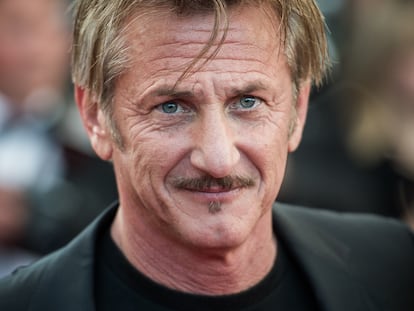
There are two anecdotes that aptly define the extra-cinematographic trajectory of Sean Penn (Santa Monica, California, 64 years old): his famous gunshots at the helicopters attempting to get images of his wedding to Madonna and the fart that he confessed to having let loose while he was with Joaquín “El Chapo” Guzmán, the violent Mexican narco, for a Rolling Stone article. “A minor traveler’s flatulence,” as he himself characterized the latter. The former tale matches the stereotype of the classic Hollywood rebel and tormented movie star that the performer, once one of the untold young celebrities to have been hailed as the new James Dean, fits so well. But the second story epitomizes his drift towards at-times extremely controversial political and social causes.
He has come to symbolize an icy, complex masculinity, and has positioned himself as “a dedicated actor of brooding intensity,” in the words of journalist Ross Simonini. Penn’s dazzling body of work includes a handful of complicated, tormented characters that can often seem in tune with his off-screen self. He has no qualms when it comes to being pegged as a “difficult person.”
Penn is heir to the Hollywood of his childhood, a Hollywood to which his father Leo Penn belonged before being ostracized over his inclusion on the industry’s blacklist of U.S. artists accused of being communist sympathizers during the 1940s and 1950s. The elder Penn was removed from the silver screen for merely supporting the Hollywood 10, a group of screenwriters, directors, and producers who were imprisoned over their refusal to answer questions from the House Un-American Activities Committee.
Leo Penn, who fought in World War II, is his son’s hero. “I cannot put myself in a position of having flown 37 missions in a war zone and being shot down twice, then coming back to the country you risked your life for and being told you can’t work here anymore. I would not have tolerated that. I would have probably looked to start a revolution,” Penn told The Talks.
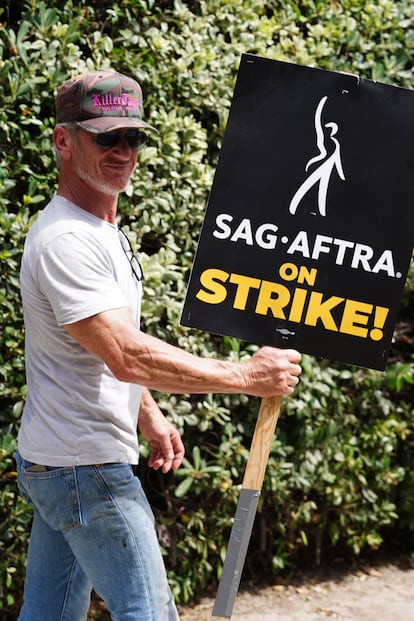
Penn’s country pains him, and he has no problem with letting it be known. His criticisms of the Bush administration over its role in the Iraq war led Fox host Sean Hannity to call him an “enemy of the state” on the air. Even so, years later, the actor appeared on Hannity’s program to raise awareness of the crisis in Ukraine. Nor has Penn minced words on Donald Trump, whom he considers “disgraceful.” One of Penn’s greatest fears is that Hollywood will kowtow to the new president in the style of the Silicon Valley moguls. He also worries about the lack of interest that the current U.S. film industry shows in taking risks, lamenting that it no longer makes movies like the one that made him fall in love with cinema as a child, that there are no longer actors like Marlon Brando and Dennis Hopper (two of Penn’s friends in Hollywood).
He referred to such concerns during the homage he received last year at the Marrakech International Film Festival. In a speech, he denounced the Academy’s cowardice, even if he does see some cause for hope. “I don’t get very excited about what we’ll call the Academy Awards, [except for] when a film like The Florida Project, or I’m Still Here [are nominated], or, you know, Emilia Pérez,” he said. Penn also took advantage of his time at the mic to call out the lack of support for The Apprentice, in which the recent Golden Globe-winner Sebastian Stan of The Winter Soldier plays Trump. “It’s jaw-dropping how afraid this business of mavericks is of a great film like that, one with great, great acting,” Penn said.
Such disillusionment with today’s industry has led him to turn to journalism and activism. “I went 15 years miserable on sets. Milk was the last time I had a good time,” he told The New York Times. That 2008 film, in which he played the titular gay politician, brought him his second Oscar. The first came courtesy of the masterful Mystic River (2003).
But Penn hasn’t gone completely rogue. He continues to work and in 2023 released the thriller Asphalt City with the French director Jean-Stéphane Sauvaire alongside Tye Sheridan, Mike Tyson and Kali Reis. It turned out to be a less substantial movie than usual for a man whose career has included such films as Dead Man Walking (1995), Sweet and Lowdown (1999) and I Am Sam (2001), for which he was nominated for Oscars, and The Game (1997) and Carlito’s Way (1993).
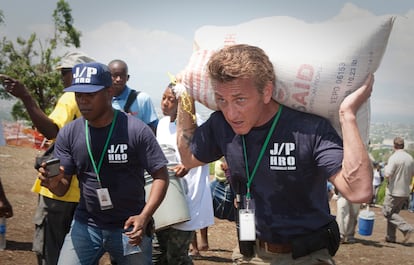
His extraordinary cinematographic personality has managed to overshadow even his volcanic real-life character, a dynamic that hardly seemed possible in the days of his early antics. In 1985, he was fined for assaulting two paparazzi who tried to photograph him with Madonna, which hardly stopped him from striking a correspondent from the Hong Kong Standard in Macau a few months later when he and the singer were filming Shanghai Surprise.
In 1986, he was charged with battery over an incident involving the musician David Wolinski, who Penn allegedly struck after Wolinski tried to kiss Madonna. The actor was sentenced to a year of probation, but never went to jail. Until, that is, a year later, when he hit an extra on his film Colors (1986). Though his original sentence was for 60 days, Penn wound up spending just 33 behind bars. He managed to avoid the courtroom for decades following that stint, but in 2010 he once again had an altercation with a photographer that resulted in a sentence of 300 hours of community service and forced enrollment in an anger management course.
Still, no situation so tainted his public image as his alleged aggressions against Madonna herself. Their relationship was always tumultuous, with Penn dubbing their wild wedding “the remaking of Apocalypse Now” after media choppers crashed the party — he even wound up shooting at the helicopters. After a SWAT team visited the couple’s home, resulting in a ruined door and Penn handcuffed and in custody, rumors and speculations surged.
Through what hell did Madonna live during her marriage to the actor? Some said that Penn “trussed her up like a turkey” and beat her for hours, including with a baseball bat. The only information forthcoming from the pair themselves came in 2015, after director Lee Daniels (Precious, The Butler) said that the crime committed by the star of his series Empire — Terrence Howard, who admitted to beating his wife — was similar to Penn’s infractions. Penn sued the director for defamation and Madonna testified under oath that all assault rumors were false, and that the actor had never struck her.
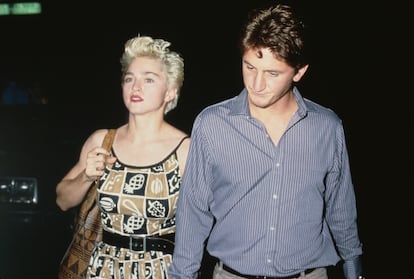
“Not only did we win the case,” Penn would later say, “but Daniels wrote a public letter and he had to contribute to CORE [Penn’s non-profit Community Organized Relief Effort].” Whether or not the allegations had any truth to them, Madonna is one of the primary contributors to Penn’s causes. For years, she called him “the love of my life” and she often appears to be one of Penn’s biggest fans.
It would also appear that during the last two decades, Penn has managed to channel his anger through tireless political and social activism. CORE has become one of his most significant projects, at times to the detriment of his acting career. During the height of the pandemic, he mounted one of the largest coronavirus testing programs in the United States, with nearly 40 locations that included highly vulnerable and neglected communities, such as the Navajo Nation reservation.
His curiosity appears to be inversely proportional to his fear of risk. In 2003, after the U.S. invaded Iraq, he traveled there, writing about the experience for the San Francisco Chronicle. Penn found the experience so gratifying that he returned to Iraq two years later. As he told The New Yorker, reporting struck him as being similar to acting. “You wake up in the morning with an interest in listening and expressing […] Finally, you’re reaching out to people’s pain.” More controversial was his interview with Mexican drug lord El Chapo Guzmán. Penn, who intended to raise awareness about the impact of drug trafficking, considered the piece a failure and the rest of the world saw it as nonsensical. Actress Kate del Castillo, in addition to Penn’s good relationships with Raúl Castro and Venezuela’s Hugo Chávez — who he considers “one of the most important forces we’ve had on this planet” — were the factors that led to his rendezvous in El Chapo’s hideout.
His humanitarian contributions have led to considerably less outrage. In 2013, he collaborated on the rescue of Jacob Ostreicher, a U.S. businessman who had been imprisoned in a Bolivian jail. During Hurricane Katrina, he rescued people, often reaching them from swimming from his own boat. In Haiti, he headed up one of the largest disaster coordination centers after the country’s 2010 earthquake. But even these endeavors have not been free of criticism. He publicly hoped that those accusing him of publicity seeking would “die screaming of rectal cancer.” Maybe that anger management course didn’t work, after all.
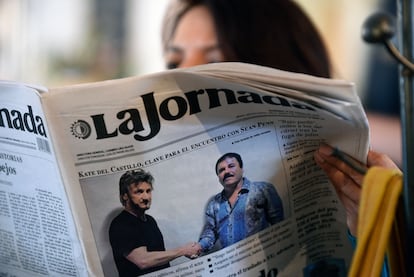
Penn’s involvement in the Haiti tragedy carried with it a sense that he was dealing with his own personal crises. It struck while he was navigating his mid fifties, after the death of his brother (Chris Penn, who had also been an actor), his divorce from Robin Wright and the public announcement that his close friend Dennis Hopper was suffering from the cancer that eventually ended his life.
“I wanted to give back something more to help struggling people, but I didn’t know how best to do it,” Penn said. “I was for 20 years in a relationship with Robin and 18 years with children. I didn’t have time to commit to anything — for real — in places like Iraq, except to denounce the war. But now I’m single. I can lend a hand.”
Being a bachelor does not appear to be his preferred lifestyle, judging by the number of relationships Penn has been in. Apart from his troubled marriage to Madonna, there have been those with Wright, with whom he had two children, and Leila George, star of the series Disclaimer and daughter of the actors Vincent D’Onofrio and Greta Scacchi. He also spoke of marrying actress Charlize Theron when they were together, though the couple never wound up tying the knot.
In an interview he gave to The Believer in 2021, Penn made it clear that he’s found a certain kind of peace. “I think there’s probably a 25, 30-year period when I tempered the shyness with alcohol, kind of a liquid-courage syndrome. But after a couple of decades or more, that gets pretty tiring. And you kind of look at the sky one day and say, What the fuck am I trying so hard for? I was much more of a loner as a kid. And then I found purpose professionally. That would cover most of the days, and alcohol, the nights. And then you wake up one day and say, You know, this game’s not so bad, and it’s not.”
Sign up for our weekly newsletter to get more English-language news coverage from EL PAÍS USA Edition
Tu suscripción se está usando en otro dispositivo
¿Quieres añadir otro usuario a tu suscripción?
Si continúas leyendo en este dispositivo, no se podrá leer en el otro.
FlechaTu suscripción se está usando en otro dispositivo y solo puedes acceder a EL PAÍS desde un dispositivo a la vez.
Si quieres compartir tu cuenta, cambia tu suscripción a la modalidad Premium, así podrás añadir otro usuario. Cada uno accederá con su propia cuenta de email, lo que os permitirá personalizar vuestra experiencia en EL PAÍS.
¿Tienes una suscripción de empresa? Accede aquí para contratar más cuentas.
En el caso de no saber quién está usando tu cuenta, te recomendamos cambiar tu contraseña aquí.
Si decides continuar compartiendo tu cuenta, este mensaje se mostrará en tu dispositivo y en el de la otra persona que está usando tu cuenta de forma indefinida, afectando a tu experiencia de lectura. Puedes consultar aquí los términos y condiciones de la suscripción digital.









































